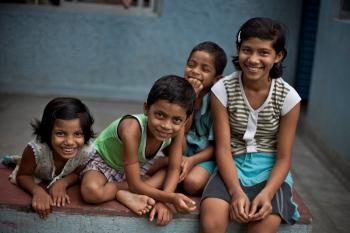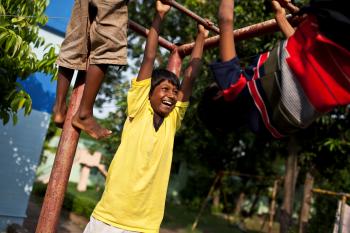Millions live in poverty in one of India's most vibrant cities

Siblings having fun together (photo: C. Ashleigh).
The city has expanded at alarming rates; it has practically doubled in size since 1981. Most of this increase is a result of migration; people moving from the poor rural areas to urban areas in search of a better life. The city suffers from all the problems that a rapidly growing urban centre has to face. There is a lack of adequate employment, infrastructure is limited (clean water, decent sanitation facilities and electricity are not available to all) and the population has to live in dilapidated and often over-crowded conditions.
There are thousands of slums in the city. Some of these slums, known as Bustees, are officially recognised and so have some basic services. However, the majority are unofficial – these are located near railway tracks and roads, or on the sides of canals or garbage dumps. The majority of people here make a living in the informal sector, and those who have a job earn low wages. Others sell small goods on the streets or pick through garbage to find rubbish or rags to sell.
Children living in these conditions risk losing parental care, as parents, who struggle to scrape together a living, often find it difficult to meet the material and emotional needs of the children. Some of these children can be found on the streets during the day, trying to scrape together some money to contribute to the family income. These children are very vulnerable as they struggle to keep safe, healthy and well-nourished. They have a high incidence of sickness and malnutrition.
The children in our care can no longer live with their parents or have been left with relatives or members of their extended families who are not in the position to provide the permanent care and support that the children need.
Supporting vulnerable families and children
SOS Children's Villages is located in Bidhannagar, Salt Lake City, east of the city of Kolkata. One reason why we decided to start working here was the large number of children without parental care who fled to the area during the war in 1971 when Bangladesh became an independent state. We work closely with local agencies and community-based organisations in order to identify families who are in need and provide them with the support they require to improve their lives.
What we do in Kolkata

Enjoying themselves on the playground (photo: C. Ashleigh).
When children can no longer stay with their parents, they can find a loving home with one of the fifteen SOS families, where they grow up with their sisters and brothers. The children attend the local kindergartens and schools, thus making friends with children from neighbouring families and integrating into the community. When the young adults are ready to leave their SOS families they can join our SOS Youth Programme. With the support of qualified professionals they are guided through this new stage of their lives, as they start vocational training courses, attend higher education and look for work. The young people are encouraged to develop perspectives for their future, learn to shoulder responsibility and increasingly make their own decisions.